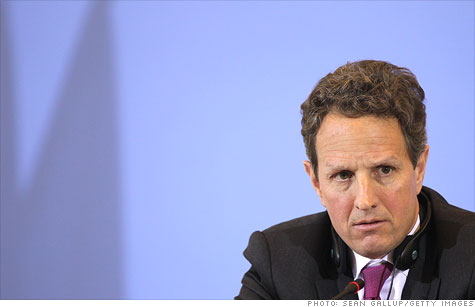Search News

It's assumed Treasury Secretary Geithner will make all interest payments to bond investors first. It's not clear yet who will come second.
NEW YORK (CNNMoney) -- Who will get paid and who won't?
That's the $14.3 trillion question as each day ticks closer to next week's debt ceiling deadline and Congress shows no sign of brokering a deal.
If lawmakers fail to raise the ceiling by Tuesday, the Treasury Department has said it will no longer be able to guarantee that it can pay all the country's bills in full and on time.
That's because Treasury will not be taking in enough revenue to cover all the bills coming due in August. And without a debt ceiling increase, it will be prohibited from borrowing new money in the bond market to make up the difference.
So, something will have to give.
The consensus thinking has been that Treasury will prioritize who to pay first and who to put off. And at the top of the list of who gets paid will be investors owed interest on U.S. debt. If the investors aren't paid, that would constitute a default, which would have a host of negative consequences for the country.
Of course, it's possible Treasury may decide it doesn't actually have the authority to prioritize and will instead pay interest owed to bond investors but pay other bills as they come due -- first come, first served, said former Treasury official Jay Powell, who coauthored a Bipartisan Policy Center report on the consequences of not raising the debt ceiling.
Assuming, however, that Treasury believes it has the authority to prioritize, it's not clear yet who will be paid first alongside investors. The Treasury has said it will provide more information as Tuesday approaches.
The plan, however, isn't likely to make anyone feel better.
That's because everyone to whom money is owed besides bond investors have either qualified for federal benefits, provided goods or services to the government, are serving in the military or otherwise work for Uncle Sam. Money will also be due to agencies to which Congress has legally appropriated money to run federal programs.
On deck to be paid every month: retirees, veterans, business owners, federal workers, active-duty soldiers, Medicare physicians and government agencies that need money to keep the lights on, to name just a few.
"While at midnight on August 2nd we don't all turn into pumpkins," White House spokesman Jay Carney said in a press briefing, he described the process of picking who to pay and who to put off as a "Sophie's choice."
How the math might work: The Bipartisan Policy Center estimates that Treasury will be short by about $134 billion for the month of August.
That cash deficit will build steadily throughout the month.
So, on Aug. 3, for instance, the center estimates that Treasury will take in $12 billion in revenue and have to pay out $32 billion, creating a $20 billion cash deficit. Among the biggest bills due that day: $23 billion for Social Security payments, $2.2 billion for Medicare and Medicaid payments, and $1.8 billion due to defense vendors.
On Aug. 4, the group estimates that the cash deficit will increase to $26 billion, with only $4 billion in revenue coming in, compared to $10 billion in bills, the largest of which would be for Medicaid and Medicare.
Come Aug. 5, the cash deficit grows another $5 billion to $31 billion.
By Aug. 15, the Bipartisan Policy Center estimates that the running cash deficit will hit $74 billion. That day the Treasury will take in an estimated $22 billion in revenue and have to pay out roughly $41 billion. The biggest bill that day is a $30 billion interest payment.
Cash on hand: What's not yet clear is how much cash Treasury might have on hand going into August.
The Bipartisan Policy Center estimates it might have enough, in theory, to pay bills in full until Aug. 10.
Even if that's right, however, Treasury may still decide to withhold some payments sooner to preserve cash to ensure it can make interest payments after Aug. 10.
It may also keep some cash on hand to ensure it can make principal payments on bonds coming due after Aug. 10.
Treasury will be able to hold bond auctions to roll over existing debt as it matures -- more than $450 billion is expected to come due in August.
However, if there isn't enough demand for Treasuries because of the uncertainty the political crisis in Washington has caused, those auctions may fail to raise all that Treasury needs to pay the principal due.
So Uncle Sam would have to pony up using the revenue coming in. That would mean even less money available to pay seniors, vets, small business owners and others who are part of the lifeblood of the U.S. economy. ![]()
| Overnight Avg Rate | Latest | Change | Last Week |
|---|---|---|---|
| 30 yr fixed | 3.80% | 3.88% | |
| 15 yr fixed | 3.20% | 3.23% | |
| 5/1 ARM | 3.84% | 3.88% | |
| 30 yr refi | 3.82% | 3.93% | |
| 15 yr refi | 3.20% | 3.23% |
Today's featured rates:
| Latest Report | Next Update |
|---|---|
| Home prices | Aug 28 |
| Consumer confidence | Aug 28 |
| GDP | Aug 29 |
| Manufacturing (ISM) | Sept 4 |
| Jobs | Sept 7 |
| Inflation (CPI) | Sept 14 |
| Retail sales | Sept 14 |